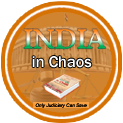Look Inside The Book
Genesis
It is possible for provisions of a written Constitution of government to be “unconstitutional” if they are inconsistent with the constitutions of nature or society. It is not ratification alone that makes a written Constitution of government legitimate, but that it must also be competently designed and applied. – O.A. Brownson1
Dear Friends,
Think India and the image that immediately flashes the mind
is that of chaos and poverty, with a few odd economic success
stories shining like tinsels on tattered rags. Seventy years of the
current form of democracy has failed India’s poor millions who
still languish in extreme poverty and sorrows of lives. Consistent
shortage of water and frequent breakdowns of power, creaking
infrastructure, lack of job opportunities, galloping inflation,
dwindling value of the rupee and dangerously depleting
environment present a nightmarish scenario of our nation which
haunts the common man
All these issues relate to the fundamental and inalienable
socio-economic requirements of a nation and concern the
welfare of the people. As they remain highly dilapidated they
are tantamount to gross human rights violations (HRV’s).
1 (i) O. A. Brownson, The American Republic: its Constitution, Tendencies,
and Destiny (1866)
(ii) Principles of Constitutional Design, http://en.wikipedia.org wiki/
Constitution
All HRV’s are defiance of the basic law (fundamental rights
and socio-economic requirements) and are justiciable in a
court of law and fall within the purview of the Judiciary to
redress. United Nations’ charter and various, treatises and
human rights protections, promulgated from time to time, also
make these submissions justiciable (Section 4.1 (p. 121)). These
requirements of our people are enumerated under Fundamental
Rights, Part III and economic and social objectives, Part IV of
our Constitution. Chapter 7 (p. 214) of this book demonstrates
the justiciability of these Rights and Objectives.
In the past 70 years, our Legislature and Executive
have consistently failed in accomplishing these objectives
(Section 6.6(i) (p. 201)); while these objectives were the sole
purpose of our struggle for freedom. India’s independence in this
respect has been a betrayal, particularly for the weaker sections
of our country (citation: Resolution in the Central Assembly –
Section 6.1 (p. 157)).
The Judiciary, the third-most powerful guardian of our
nation, is also concerned about the nation and its impoverished
masses. The author hopes the Judiciary will lend its ear to
hear the sighs of sorrows and grief of its suffering masses and
take cognizance of the consistent regression of the nation and
the stark poverty that has besieged our debilitated masses.
Perennial relief operations by successive governments to
artificially salvage the situation have proved a failure. Such
relief operations are human rights violations and cannot be a
long-term solution for perennial predicaments (Section 1.3 (p.
34)). In our case our guardians have played havoc with the very
people they were supposed to protect.
The rights of the people of India are protected by our
Constitution and also the charter and various treaties of the
United Nations (UN) such as the Universal Declaration of
Human Rights (UDHR, 1948), the International Covenant of








